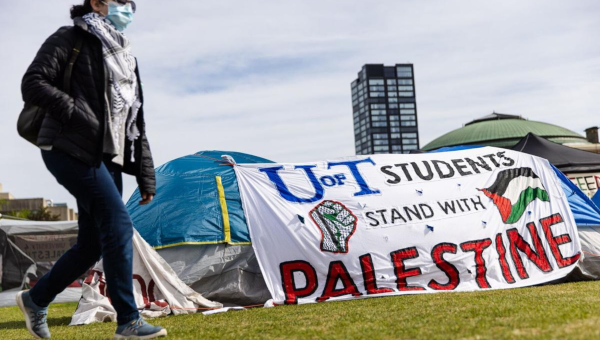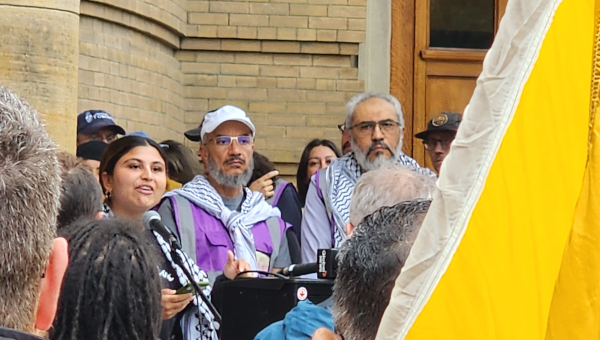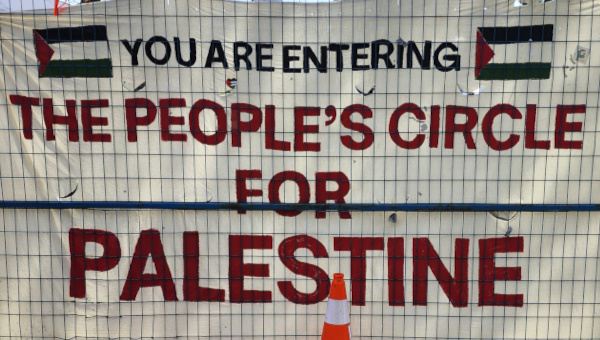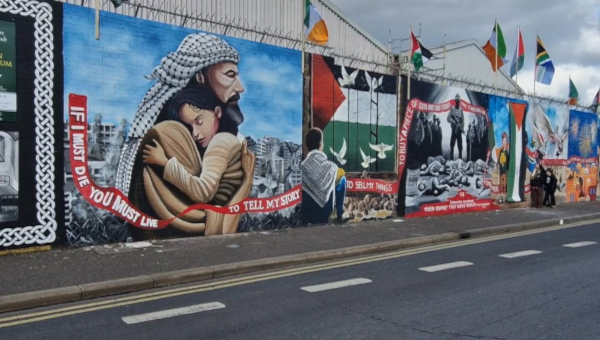What Next? The Freedom Flotilla and the Struggle to Break the Siege of Gaza
While people around the world are still in shock at the killing by Israeli commandos of innocent human rights activists on board the Gaza Freedom Flotilla, those who have been following Israeli state actions for some time are not surprised. This is an ongoing pattern of Israeli state terrorism and collective punishment. While we mourn the dead on the boats, we must not forget that the Flotilla itself is in response to an even greater brutality – the slow starvation of more than 1.5 million people trapped in an open air prison called the Gaza Strip.
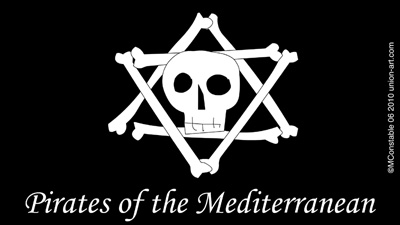 The siege of Gaza, now highlighted by the attack on the Flotilla, has been ongoing since 2006. It amounts to nothing more than collective punishment. It is not only illegal, but also completely immoral – aimed squarely at suffocating the Palestinian population. The policy according to Israeli officials is ‘no prosperity, no development, no human crisis.’ The point is to make sure that life in Gaza is intolerable, but that there is enough of a trickle of aid that it is not deadly. Construction material has not been allowed in, so hardly any new building has taken place since the 2008-09 Israel war on Gaza (dubbed Operation Cast Lead). UNRWA (The United Nations Relief and Works Agency for Palestine Refugees in the Near East) schools are still doing double shifts and items like notebooks are not permitted into Gaza by the Israeli embargo. Those seeking medical attention have to apply for Israeli permits to leave, and most of the time permits are denied. The water situation is deplorable. Despite Israeli proclamations about Hamas and terrorism, it is clear that the siege of Gaza is about controlling the population and making life as miserable as possible. It is just such a state that can treat a population under its control with such brutality – in violation of a battery of international laws and human rights rulings – that is capable of killing international aid workers. And then still scream defiantly that it was all in ‘self-defence.’
The siege of Gaza, now highlighted by the attack on the Flotilla, has been ongoing since 2006. It amounts to nothing more than collective punishment. It is not only illegal, but also completely immoral – aimed squarely at suffocating the Palestinian population. The policy according to Israeli officials is ‘no prosperity, no development, no human crisis.’ The point is to make sure that life in Gaza is intolerable, but that there is enough of a trickle of aid that it is not deadly. Construction material has not been allowed in, so hardly any new building has taken place since the 2008-09 Israel war on Gaza (dubbed Operation Cast Lead). UNRWA (The United Nations Relief and Works Agency for Palestine Refugees in the Near East) schools are still doing double shifts and items like notebooks are not permitted into Gaza by the Israeli embargo. Those seeking medical attention have to apply for Israeli permits to leave, and most of the time permits are denied. The water situation is deplorable. Despite Israeli proclamations about Hamas and terrorism, it is clear that the siege of Gaza is about controlling the population and making life as miserable as possible. It is just such a state that can treat a population under its control with such brutality – in violation of a battery of international laws and human rights rulings – that is capable of killing international aid workers. And then still scream defiantly that it was all in ‘self-defence.’
Israeli Impunity
As Western governments fall over each other with ‘regret for the loss of innocent life,’ it is the ‘international community’ that has enabled Israel to act with such impunity (with the U.S. and Canada at the forefront of providing cover for Israel, alongside the muted acquiescence of the Arab states). Canada was the first state to cut aid from the democratically elected government of Hamas in 2006, without any regard to the impact on ordinary Palestinians, and now has become the staunchest defender of Israel, whatever its actions, internationally. Indeed, as the attack on the Flotilla was taking place, Israeli Prime Minister Binyamin Netanyahu was being welcomed with open arms at a meeting in Ottawa. The Premier of Ontario, Dalton McGuinty, has just returned from a trip to Israel where he traveled to forge stronger business ties. Importantly, in the case of the Flotilla, the U.S. and Canada have shamefully shielded Israel from an impartial international inquiry, arguing instead that Israel should investigate itself. The perpetrator of the crime placed in charge of the investigation!
On the international level, Israel continues to build strong economic links with a range of states. In late May 2010, the Organization for Economic Co-operation and Development (OECD) made their decision to admit Israel. In a press release on the OECD website, its general-secretary, Angel Gurria, states: “This new chapter in the history of the Organisation confirms our global vocation as the group of countries that search for answers to the global challenges, and establish standards in many policy fields such as environment, trade, innovation or social issues.” At the time a spokesperson for the Palestinian BDS National Committee (BNC) commented, “By accepting Israel, OECD member countries show a blatant complicity with Israeli war crimes, destroying the very foundations of international law. Rewarding Israel entrenches its impunity and dashes any realistic hope for achieving a just peace in the region.” It should not come as a surprise that when Israel is rewarded for its brutal military actions by further integration into global power structures – with the consistent backing of Canada and the U.S. – it continues along the same path.
Turkey and Greece, for example, had been planning military exercises with the Israeli army despite the war and now ongoing siege of Gaza (only canceling after the attack on the Flotilla). This is not to mention the disgraceful relationship between the Arab regimes and Israel, with Egypt acting as partner in the Gaza siege. These economic, military and diplomatic relations continue despite Israel’s record of human rights violations, Israel’s ongoing illegal settlement construction, the building of the illegal apartheid wall and the numerous United Nations resolutions that Israel flaunts. It is this type of overt support and moral acquiescence that Israel relies upon. It is what allows Israel belief it can hijack a humanitarian convoy in international waters, kill aid workers, and kidnap citizens from dozens of countries without facing recourse.
The sheer arrogance by which Israeli state spokespersons have been responding to questions about the Flotilla attack is also part of engrained strategy for management of the international media. It has been consistent with every Israeli PR campaign employed in the wake of war crimes. This propaganda campaign consists of two parts: first, legitimating every action Israel does as self-defence and as defensible in international law; and, second, delegitimating the victims of Israeli actions by them as terrorists. As such, Israel’s arguments have repetitive themes of blameless innocence. The occupations of the West Bank and Gaza are legitimate and justified as simply a necessary self-defence against terrorism; the brutal war against and the blockade of Gaza are legitimate acts of self-defence against terrorists and thus both are justified and legal; and to assure Israel is not infringed upon by aid being given to terrorists, Israeli commandos had the right to attack a ship in international waters. And if these civilians and human rights workers on the Gaza aid ships defended themselves against a military that was attacking them, they did not properly understand that they were aiding terrorism, and it is their own fault that they inadvertently fell victim to Israel’s legitimate needs of self-defence. One can only wryly observe: if Israeli commandos panic at plastic chairs and sticks, then Israel is wasting a lot of money on military training!
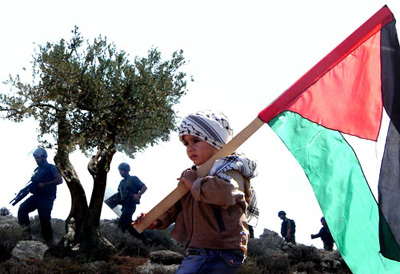
As for the Israeli charges that the aid activists have relations to Al-Qaeda and that the ships were carrying weapons, there has not been one shred of evidence provided. The pictures of ‘weapons’ found make a laughing stock of a military power that holds a nuclear arsenal and has access to all the latest weaponry that U.S. aid can deliver – sticks and tools that can be found on any ship, toy marbles for children and other banal objects. The Israeli media tactic is to pound out the words Al-Qaeda, Hamas, Iran and Islamic terrorism as often as possible. The mere repetition of the words is to make all Israeli actions justifiable, and ensure that diplomatic support from Canada and the U.S. forthcoming. But fewer and fewer people are accepting these outlandish claims and the Israeli propaganda barrage. Israeli society – historically steeped in absolute paranoia and racism, and veering in an increasingly authoritarian direction in its own internal politics – may be willing to believe these myths. But to the rest of the world, the Israeli analysis and defence of its brutal actions are delusional at best, and transparent vulgar justifications of crimes at worst.
In light of the deadly attack on a flotilla of ships carrying basic aid and led by human rights activists, the Israeli media campaign is faltering. The absurdity of claims of self-defence is too obvious. The disconnect between the official Israeli state story and what everyone around the world saw from the live stream on the boats is too striking (even when the Western media selectively repeats the use of Israeli footage, and ignores feeds from the non-Western media aboard the ships). This does not stop the Israeli state from spinning the same stories and telling lies with a poker face. They can count on the mainstream media outlets in Canada, the U.S. and Britain to parrot the lies and assure Israeli spokespeople get ample airtime.
Turkey and the Arab States: Can They Be Tested?
Turkey and most Arab states are reacting strongly to the attack. The rhetoric from the AKP (Adalet ve Kalkinma Partisi – Justice and Development Party) government in Turkey has certainly been strong and the condemnation of both the attack on the Flotilla and the siege of Gaza pronounced. The question in the next days will be how strongly Turkey will stand behind its statements and follow it by action. Turkish governments have a long history of making bold statements on Middle East issues, and following it up by quite the opposite in action. The motion eventually passed by the Turkish Parliament called for cutting economic ties although there was a debate on the issue and the ruling party initially opposed the inclusion of this demand. The Turkish Deputy Prime Minister, however, has said “it is not in our tradition to cut off economic relations as a first step, we will turn to international law and take our case there.”
As most Arabs know all too well, governments can sound as strongly pro-Palestine as possible, but continue on normal relations with Israel. Or in the case of Egypt and Jordan openly do Israel’s work for it. The real push in Turkey must now be to the cutting of economic and military ties with Israel. The Turkish state, however, with the backing of the AKP government, is deeply invested in neoliberalism, completely incorporated in NATO structures and continuing to forge strong economic relations with Israel. It will be interesting to see how the AKP government will manoeuvre in the next few days around the issue of economic sanctions on Israel. It is receiving pressure, on the one side, from its populist and Islamist base, and, on the other, from various secular and left forces, both increasingly sympathetic to the Palestinian struggle. Activists within Turkey are taking the opportunity to call for the severing of all ties to Israel, and to use the political sentiments created by the Flotilla tragedy to assure Turkey plays a constructive role, beyond the habit of the Turkish state to relapse into empty rhetoric, in breaking the siege on Gaza.
As for Egypt, its complicity with Israel (and the U.S. administrations of both Bush and Obama) in the Gaza siege is beyond mere embarrassment at this point for the bankrupt regime of President Hosni Mubarak. The Egyptians had to open the Rafah crossing into Gaza, not out of the kindness of Mubarak or his sorrow over the dead in the Flotilla. It was a result of domestic pressures in Egypt, and the boiling cauldron of opposition to the futility of the Egyptian state. But this is only the beginning act of the drama to unfold. The next act will tell us at what point, under what circumstance and with what justifications the Egyptian government will explain closing the Rafah gate again. There is every reason in the world to expect the Egyptian state to do just so, given its dependence on the U.S. for its political existence and its unwillingness to sacrifice its alliance with Israel under any circumstances. It is important that the international solidarity movement to start mobilizing for just such a turning-point when a closure of the Rafah crossing is attempted, and ensure that Egypt faces world-wide protests. This will also require support for activists in Egypt facing the brutal Mubarak regime.
A similar story can be told of Jordan and its dependent relations on Israel and the United States. King Abdullah, under the constant prodding of the U.S., has been deepening ties with Israel for quite some time. Indeed, trade relations between Jordan and Israel have continued to grow even with deepening turmoil in the West Bank and Gaza. Israeli fruits and vegetables flood Jordanian markets, and free trade zones with Israeli companies continue to operate and expand in Jordan. The Hashemite monarchy is attempting to offset the mass anger of the Jordanian population at the Flotilla attack by recalling its ambassador. In reality all that means is that the ambassador takes a one-hour road trip and sleeps in his house in Amman for a few nights, while business carries on as usual. Jordan and Egypt may be the worst examples, but they are all too representative of the kinds of symbolic gestures that the repressive Arab regimes make toward Israel while in fact deepening ties, and allowing the siege of Gaza to continue.
The Arab League and individual states have all held their emergency meetings this week, and, of course, condemned the attack on the Flotilla in the strongest language, and called for debate on the issue before the UN. Kuwait has withdrawn from the Arab ‘peace initiative,’ but severing economic relations is delayed. Qatar has made a gesture toward normalizing its relationship with Israel by reopening the Israeli trade office in Qatar, but now only if Israel allows in the much needed construction material into Gaza. (Netanyahu has, not surprisingly, simply refused the offer.) Instead of rallying to cut all aid ties, or finding other means to help break the siege, the Arab leadership have become masters at negotiating their own concessions to U.S. and Israeli overtures. The Arab states make verbal gestures and sign paper proclamations, but sit and watch Palestinians fight it out themselves. This abject obeisance of the Arab states to the existing power structures of the world order needs to be tested.
There are very strong and legitimate calls coming from Palestinians for the Palestinian Authority (PA) to suspend all talks – direct and indirect – with Israel. So far this is being ignored. The PA has called for three days of mourning in the West Bank – a necessary gesture of solidarity, but politically without significance as a response to the assault. The PA, too, has learned from other Arab states to take symbolic acts to defuse popular anger without formulating new strategies of action toward forcing Israel to lift the siege.
Palestinians in Israel
A significant aspect of the developments from the Israeli attack on the Flotilla is the role played by Palestinian citizens of Israel including, most prominently, the role of Palestinian Knesset member Hanin Zoabi. Zoabi was on the Mavi Marmara boat and upon returning explained to the global media willing to listen that the commandos started firing even before they landed on the ship. When Hanin Zoabi entered the Knesset, the entire gathering erupted in protest; she was not allowed to continue her speech and was threatened. Miri Regev, an MK from the Likud party, told Zoabi: “Go to Gaza, you traitor… We don’t need Trojan horses in the Knesset.” The Israeli media has also reported that the Interior Minister is looking into revoking Zoabi’s Israeli citizenship.
The irony of this dispute in the Knesset is rich. Any time the word ‘apartheid’ is mentioned with respect to Israel, the pro-apartheid camp of Israeli defenders of the Occupation gets up screaming, ‘but you have Arab members of Knesset’ (most Israelis call them Arab because they refuse to recognize them as Palestinian, to sustain Zionist founding myths). Zoabi’s case has highlighted the contradictions of Israeli apartheid: claiming to be a democracy while treating Palestinian citizens of Israel as third class citizens. The role of Palestinians in Israel is a central component to the struggle against Israeli apartheid, and the courageous actions of Palestinian leaders such as Zoabi point toward the increasingly positive role they play in the liberation struggle.
Ending the Siege: The Way Forward with BDS
Palestinian civil society has been saying consistently for five years now that the only way to end Israeli war crimes is to implement a campaign of boycotts, divestments and sanctions (BDS) against Israel. This campaign makes the case that Israel must be isolated and treated as a pariah state. After the attack on the Gaza Freedom Flotilla, many more people and organizations are turning to BDS as an important measure to highlight the complicity of governments around the world with Israeli apartheid.
Already dock-workers unions in Sweden have said they will not load ships to, or unload ship from, Israel or handle any Israeli produce between June 15th and June 24th. Statements condemning the attack have been issued by numerous unions from around the world. Nicaragua and South Africa have both recalled their ambassadors.
The real work now for the international Palestinian solidarity campaign is to make sure that matters don’t stop at angry rallies and letters of condemnation over the next weeks (as other ships follow in the stream of the MV Rachel Corrie now heading toward Gaza to break the siege). Further concrete BDS actions will be needed to be taken by labour unions, student unions, faith and community groups. It will not be governments that take the lead in ending the siege of Gaza. The siege will only end by the organizing and struggle of all of us – activists in the Palestinian liberation struggle, human rights workers, community organizers across numerous campaigns, ordinary workers in unions – in every space possible. The edifice protecting Israeli apartheid is beginning to crumble. The Gaza Freedom Flotilla has exposed further cracks, and now we need to take the struggle forward, in ever more inventive ways with ever more determination. •
Resources:


